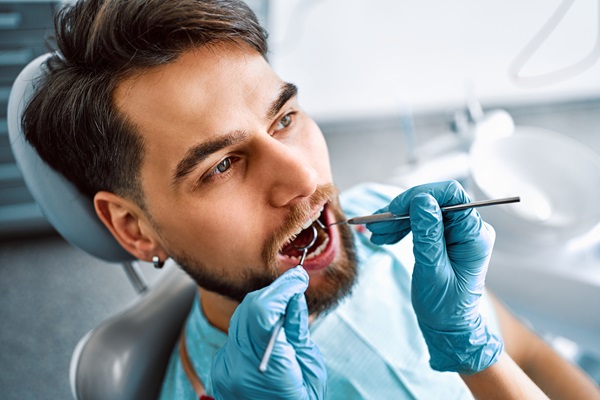Oral Conditions Your Dentist Looks for During a Dental Exam

Most patients understand the purpose of a dental exam, which is to check on the health of teeth and the gums. However, you may be surprised to learn just how thorough of an inspection process a dental exam actually is. This review discusses the various oral conditions that your dentist can check for during a dental exam.
What does a dentist check for during a dental exam?
Your dentist will check for gum disease (both gingivitis and periodontitis), TMJ disorder, bruxism, sleep apnea, and oral cancer during a dental exam, among other possible concerns such as dental cavities, impacted teeth, and oral infections. Your dentist may use both the oral examination as well as dental x-rays to check for these oral health concerns.
Gingivitis
Gingivitis is a milder form of periodontal disease. The symptoms are typically less severe with gingivitis. The various signs that a dentist may check for include gum irritation, gum swelling, and mild discoloration. Patients with gingivitis may also experience gum bleeding while brushing or flossing, as well.
Periodontitis
Periodontitis is a more severe form of periodontal disease. Gingivitis can progress into periodontitis if it is not promptly diagnosed during a dental exam and treated accordingly. The symptoms of periodontitis include gum recession and deep gum pockets, along with many of the symptoms associated with gingivitis. Scaling and root planing may be recommended to treat periodontitis.
TMJ disorder
The temporomandibular joint (TMJ) is responsible for opening and closing the jaw. TMJ disorder occurs when there is pain and limited movement of the TMJ. A dentist can check for signs of TMJ disorder during a dental exam, and many offer treatment options to alleviate the symptoms of TMJ disorder.
Bruxism
Bruxism (also known as teeth grinding) is a common cause of TMJ disorder, and it can also impact the appearance and health of teeth. Dentists check for signs of bruxism during a dental exam, which is especially important since many who struggle with bruxism are not aware that they do so until the symptoms (e.g., worn-down teeth) become severe.
Oral cancer
Oral cancer screenings are the best way to determine if there are any concerning signs, and those at higher risk should schedule annual cancer screenings separate from their regular dental exam. However, a dentist can still check for more obvious signs of oral cancer during the visit.
Sleep apnea
Sleep apnea can affect someone without them realizing it. A dentist cannot diagnose sleep apnea from a dental exam, but they can look for signs that it may be a concern, especially when combining the dental exam with a discussion of any sleep concerns the patient is having.
Common questions about dental exams
The following are common questions about dental exams and the detection (and prevention) of oral diseases.
What else does a dentist look for during a dental exam?
Of course, the primary purpose of a dental exam is to assess the health of the patient’s teeth and gums, in addition to checking for signs of various diseases and conditions as described above. Specifically, dentists also check for signs of tooth decay, chipped teeth, cracked teeth, severe teeth stains caused by plaque and tartar, and warning signs of periodontal disease. As mentioned, dentists also evaluate the health of the patient’s jaw, as well.
What tests are used during a dental exam?
An oral examination simply involves the use of non-invasive dental instruments that the dentists use by hand. They may also utilize dental x-rays. There are a variety of dental x-ray types, each of which offers a unique view of the mouth. From there, the diagnostic tests that are performed can vary. For example, a dentist may recommend a more in-depth oral cancer screening or a biopsy if potential signs of oral cancer are detected.
Are there ways to prevent oral diseases?
There are things that every person can do to reduce their risk of oral diseases such as periodontal disease, bruxism, and oral cancer, although not all cases of oral disease are preventable. Talk to your dentist about prevention techniques to implement between dental exam visits.
Schedule a dental exam with us
Here at our dental practice, we believe in being thorough during the dental examination process, and we conduct an extensive check on the status of your oral health. To schedule a visit for a dental exam and to put together a long-term prevention and treatment plan to help you maintain optimal oral health, contact us today.
Request an appointment here: https://www.mysaratogadentist.com or call My Saratoga Dentist PLLC at (518) 675-3094 for an appointment in our Saratoga Springs office.
Check out what others are saying about our dental services on Yelp: Dental Cleaning and Examinations in Saratoga Springs, NY.
Recent Posts
A healthy smile depends on more than daily brushing and flossing. If you are experiencing gum disease or severe plaque buildup, a deep teeth cleaning can restore your oral health. Unlike a standard dental cleaning, this treatment targets bacteria below the gumline and reduces the risk of serious oral health issues.Deep teeth cleaning, also known…
Maintaining optimal oral health involves more than daily brushing and flossing. Deep cleaning plays a critical role in preserving gum health and preventing long-term complications such as periodontal disease. This advanced dental procedure goes beyond routine cleaning to target bacteria and plaque beneath the gumline, helping patients maintain a healthy mouth and a confident smile.Deep…
A healthy and clean mouth requires more than brushing and flossing daily. Professional deep teeth cleanings can help prevent severe oral health issues, particularly beneficial for those with moderate to severe gum disease or plaque buildup. Deep teeth cleanings address issues that regular cleanings may miss or not be able to fully address, promoting healthier…
A dental exam is performed to determine the condition of the patient’s oral health. The goal is to detect any concerns as early as possible so that they do not worsen or cause other health issues. This article discusses the types of oral issues your dentist may look for during a dental examination and cleaning…


